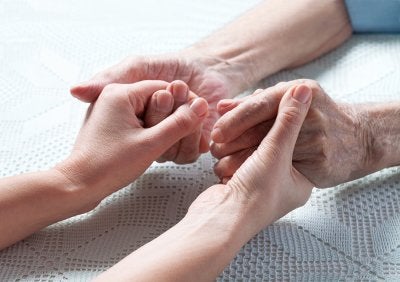-
What to Expect After a Hip Fracture
A hip fracture can be a painful and debilitating injury that requires a lengthy recovery. Generally, people can benefit from having an in-home caregiver to assist during their recoveries, when their mobility may be limited. Here is a look at what you can expect while you recover from a hip fracture and how in-home care in Memphis may be helpful.

Rehabilitation
After surgery to repair your hip fracture , you will undergo physical therapy during rehab in the hospital where you had your surgery or in a rehab facility. This physical therapy is designed to help you regain some basic mobility and begin to rebuild the muscles that will support your repaired hip. Usually, you will not be allowed to return home until you can confidently go up and down the stairs. You may be surprised how quickly you are out of bed and moving around, but this is actually an important part of your recovery. In most cases, patients can avoid complications associated with hip fracture surgery by walking as soon as possible.
Transition Care
When you return home from surgery, there are still many activities you won’t be able to do on your own. During this time, transition care provided by an in-home caregiver can be helpful, especially if your loved ones must work during the day. An in-home caregiver can help with everything from personal hygiene needs to cooking and light housework. A transitional caregiver can also be present to help you stick to the recovery plan recommended by your surgeon, including getting up and walking around at regular intervals. You won’t be able to sit for longer than 45 minutes without getting up and moving. A physical therapist may also come and visit you in your home during this time.
Return to Normal Activities
The rate at which patients can return to their normal activities varies. If you work an office job, you may return to work within six to eight weeks of surgery. You may not be able to return to physically demanding activities until three to six months after your procedure. Your surgeon will carefully monitor your recovery and advise you when you can resume your activities.
-
Communicating with a Loved One with Dementia
When a loved one has dementia, learning a new way to communicate with him or her can be difficult. Fortunately, with a little effort, you can still maintain a special connection with your loved one, even as his or her memory fails. Often, your in-home elder care provider can offer advice based on his or her experience working with people with dementia in Memphis . These tips will also help.

Set the Tone
You can have more productive communication with a loved one with dementia if you choose the right time and place. Make sure there are no distractions, such as TV or radio, when you begin a conversation. Sit close to your loved one and position yourself so that you are facing him or her directly. The lighting should be adequate so that your face can clearly be seen. Keep your body language relaxed, even if you feel nervous and frustrated. It is more useful to begin conversations when your loved one’s needs have been adequately satisfied, so ask his or her elder care provider when your loved one has last eaten and when he or she usually sleeps.
Keep it Simple
Dementia can make following multi-layered conversations difficult, so keep things simple to avoid frustration. Stick to one topic. It can even be helpful to choose a topic in advance and plan some of the things you would like to say. Your sentences should be short, and you should choose simple words. Don’t talk to your loved one as though he or she is a child. Address him or her in a normal tone of voice and be respectful. Dementia can be isolating, and your loved one may feel like he or she is no longer valued.
Be a Good Listener
Your loved one with dementia will still have many ideas he or she wants to express, so be sure to be a good listener. If you aren’t sure you have understood, repeat the point back to verify it. Pay close attention to your loved one’s body language. As dementia affects your loved one’s ability to speak, his or her body language will be a central part of how he or she communicates. Always let your loved one express his or her feelings without dismissing them.
-
Planning for Care at the End of Life
No one likes to think about his or her own death or the death of a loved one, but planning for end-of-life care can make a painful situation easier for everyone. Hospice care in Memphis can play an important part in end-of-life care. Watch this video to learn more.
Try starting a conversation about end-of-life care before someone is facing a terminal illness so that you know your loved one preferences. There are many different options, including terminally ill caregiving at home and hospice home care that provides support for both the patient and the family. Deciding about end-of-life care before it is needed helps families focus on the time they have left together when a terminal illness occurs.
-
Steps to Take When a Loved One Dies at Home
Individuals who are in hospice care are often more comfortable living out the rest of their lives at home. The majority of end of life caretaking in Memphis may be handled by hospice professionals and by an in-home caregiver from a private agency. The primary family caregiver, who is usually the spouse or an adult child, will need to have a checklist of steps to take when the individual passes on.

Locate the DNR
It is likely that your loved one would have a “do not resuscitate” (DNR) order if he or she is in hospice care. You will need to know about this as soon as your loved one enters into hospice care. The DNR is a document that must be issued by a physician. It instructs healthcare providers and/or first responders not to initiate resuscitation efforts in the event that the individual displays cardiac or respiratory arrest. Without a DNR, healthcare providers are required to perform cardiopulmonary resuscitation (CPR). This results in a distressing situation for the surviving family members.
Call Hospice and the Caregiver Agency
After a loved one dies at home , there is usually no need to act immediately. You may wish to sit with your loved one in quiet reflection or you may need to go elsewhere in the home to gather yourself. When you’re ready, call the hospice care team and the private caregiver agency to notify them of the death. They will arrive at your home shortly to assist you and make the official pronouncement.
Contact the Funeral Home
If pre-need arrangements have already been made, you can call the funeral home to notify them. Otherwise, select a local funeral home and make arrangements for the collection of the body. Before the funeral home representatives arrive, the hospice nurse and other caregivers will have already taken certain steps to care for the body and disconnect medical equipment, if necessary.
Make Notifications
If you have close family members nearby, you may wish to notify them before you call the funeral home. They may wish to spend some time with the decedent before he or she is removed. Otherwise, you can make notifications as soon as you feel able to do so. You may not need to make every phone call; notify a core group of close family members and ask that they finish the notifications for you.
